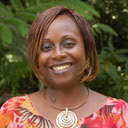
Field trip at the experimental forest of the National School of Forestry in Mbalmayo, Cameroon. Journalists trained by CoFCCA visited the forests to document their importance.
ADDIS ABABA, Ethiopia (March 15, 2011) _ Many people living in the Congo Basin cite the media their main source of information about climate change and global warming, highlighting the critical importance of the local press in raising awareness about these issues.
In a region where schools and universities do not prioritise climate change issues, it is critical that Central African journalists are trained to gain the specialised knowledge required to objectively discuss these issues in their stories.
Misconceptions about climate change still persist in society, particularly in understanding commonly used environmental jargon, showed a study conducted in DR Congo by the BBC World Service Trust in 2009.
“The term “climate change” should have standard translations in local and national languages, and awareness-raising initiatives should contextualise the term so that people understand its relevance to their own lives,” said the study.
Alarmingly, it was also found that very few urban dwellers are aware of the existence of a political debate around funding for forests. It all comes back to the role of the media in providing people with information about climate change.
“Media representatives themselves recognise that more needs to be done to develop climate change awareness in the sector,” the study concluded.
To inform the dialogue around climate change, The Congo Basin Forest and Climate Change Adaptation Project (CoFCCA) was founded in 2008 funded by International Development Research Centre (IDRC) and hosted by the Center for International Forestry Research (CIFOR). They soon realised that there was a great need for media training on climate change coverage and reporting.
Since 2009, CoFCCA has developed workshops with media representatives in several Central African countries, aiming to strengthen the ability of their media to deal with forest related issues and to foster partnerships between researchers and journalists, ensuring that future climate change coverage is well informed.
CoFCCA has also recently launched a fellowship programme for journalism and communication students to conduct their research thesis on adaptation to climate change and forests-related issues in Central Africa.
And they are aiming to go one step further in 2011; conducting regional workshops with directors of schools and universities to discuss ways to introduce forest and climate change issues into their programs.
In a paper presented to the Africa Adapt Conference held in Ethiopia last week, Edith Abilogo, Denis Sonwa and Youssoufa Bele from CIFOR’s Central African office in Cameroon insist that well-trained journalists have a real opportunity to influence stakeholders involved in the forestry sector and this will translate to increased awareness among the general public about issues related to climate change.
We want you to share Forests News content, which is licensed under Creative Commons Attribution-NonCommercial-ShareAlike 4.0 International (CC BY-NC-SA 4.0). This means you are free to redistribute our material for non-commercial purposes. All we ask is that you give Forests News appropriate credit and link to the original Forests News content, indicate if changes were made, and distribute your contributions under the same Creative Commons license. You must notify Forests News if you repost, reprint or reuse our materials by contacting forestsnews@cifor-icraf.org.




